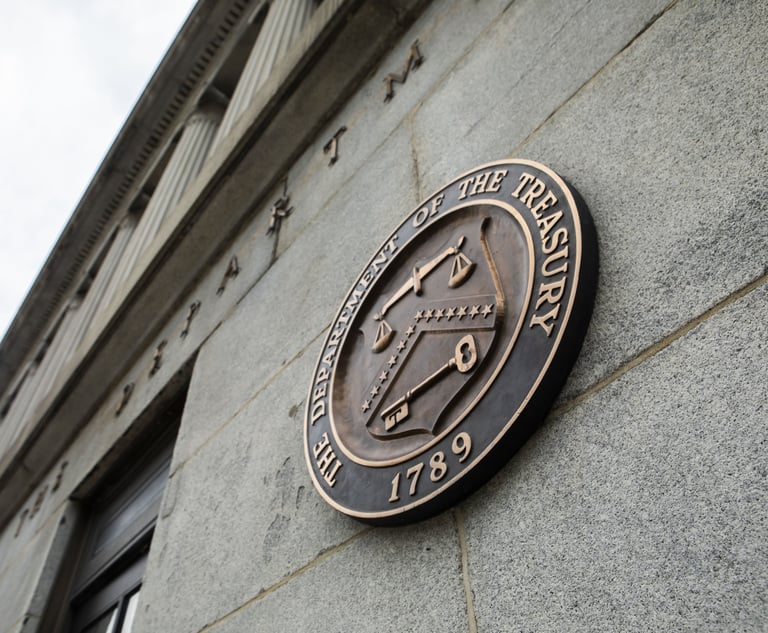Family of Mexican Teen Shot by Border Patrol Can't Sue, Split Court Rules
In a divided ruling, the majority of the U.S. Court of Appeals for the Fifth Circuit panel said the family had no constitutional standing to sue the border patrol agent.
March 26, 2018 at 01:35 PM
5 minute read

A federal appeals court has ruled that a Mexican family, whose 15-year-old son was shot and killed by a U.S. border patrol agent while on the Mexican side of the border, may not sue the agent for damages.
In a divided ruling, the majority of the U.S. Court of Appeals for the Fifth Circuit panel said the family had no constitutional standing to sue the border patrol agent.
In a majority ruling written by Judge Edith Jones and released on March 20, the court reversed a prior circuit decision holding that the family of the teenager, Sergio Adrian Hernandez Guereca , could pursue claims against U.S. Customs and Border Patrol Agent Jesus Mesa Jr. The case was on remand from the U.S. Supreme Court.
Jones, joined by 12 other judges, said that while the shooting was “tragic,” Hernandez's family had no standing to bring a claim against Mesa.
“Implying a private right of action in this transnational context increases the likelihood that board patrol agents will 'hesitate in making split-second decision,'” Jones said, quoting the U.S. Court of Appeals for the Third Circuit's 2017 ruling in Vanderklok v. U.S.
According to the court, Mesa shot and killed Hernandez, 15, on June 7, 2010, while he was in a culvert along the border between Ciudad Juarez and El Paso. Mesa said he opened fire because Mexican youths were throwing rocks at him, according to the ruling,which said law enforcement officers are allowed to open fire if they believe their lives or safety are in danger.
Courts already have ruled that the Hernandez family cannot bring civil counts against the U.S. itself.
After the shooting, border patrol said Hernandez had been apprehended for, but never charged with, smuggling aliens across the border into the U.S., the court said.
U.S. District Judge David Briones of the Western District of Texas, sitting in San Antonio, found in 2011 that the family could not sue because the shooting's effects were “felt in Mexico.” But the Fifth Circuit later reversed, saying that Briones' “territorial approach” would allow agents to establish “zones of lawlessness.”
It “would establish a perverse rule that would treat differently two individuals subject to the same conduct merely because one managed to cross into our territory,” the appeals court said then. It also said that giving people standing on Mexican soil protection from “conscience shocking” actions by border agents, such as the shooting of Hernandez Guereca, is not a new policy. Immigrants who are inside the U.S.—even those who are to be removed from the country—”are entitled to feel free of gross physical abuse by federal agents,” the circuit ruled.
Extending that right to people injured across the border by U.S. agents standing on U.S. soil would inform the officials that they are not allowed to arbitrarily inflict harm in this “new, but similar, context,” the court said.
The government then appealed to the U.S. Supreme Court, which remanded the case.
“Because Hernandez was a Mexican citizen with no ties to this country, and his death occurred on Mexican soil, the very existence of any 'constitutional' right benefiting him raises novel and disputed issues,” Jones wrote in the March 20 ruling. “To date, the Supreme Court has refused to extend the protection of the Fourth Amendment to a foreign citizen.”
U.S. District Judge Edward Prado, sitting by designation, issued a dissent in which Fifth Circuit Judge James Graves joined. The dissent said it would have allowed the teen's family to pursue claims against Mesa.
“This case simply involves a federal official engaged in his law enforcement duties acting on United States soil who shot and killed an unarmed 15-year-old boy standing a few feet away,” Prado said. “I would elect to recognize a damages remedy for this tragic injury.”
Mexican authorities had sought to prosecute Mesa on criminal charges, but the U.S. government rejected an extradition request, according to the court.
The attorney for the teen's family, Robert Hilliard, issued a statement denouncing the ruling.
“[T]he Fifth Circuit made it abundantly clear it will not be dissuaded in its view that Sergio and others who are standing in Mexico may be gunned down for any reason by anyone with a badge standing feet away in the united states—and, when this happens, the shooter, who wears a badge and has sworn to follow the constitution, will be unfettered by the Fourth Amendment constraint on excessive force,” said Hilliard, of Hilliard Martinez Gonzales in Corpus Christie.
“The Supreme Court must now decide if this is going to be the law of our land: That in the United States there will be no constitutional consequences when cops stand on the border and shoot across into Mexico at Mexico's citizens, or even shoot American citizens standing in Mexico,” he said.
Mesa's attorney, Randolph Ortega of Ellis & Ortega in El Paso, could not be reached comment.
This content has been archived. It is available through our partners, LexisNexis® and Bloomberg Law.
To view this content, please continue to their sites.
Not a Lexis Subscriber?
Subscribe Now
Not a Bloomberg Law Subscriber?
Subscribe Now
NOT FOR REPRINT
© 2025 ALM Global, LLC, All Rights Reserved. Request academic re-use from www.copyright.com. All other uses, submit a request to [email protected]. For more information visit Asset & Logo Licensing.
You Might Like
View All
Bracewell Adds Former Pioneer Natural Resources Lawyer to O&G, Energy Transition Practices
2 minute read
Ex-Jenkens & Gilchrist Lawyer Convicted in Tax Shelter Scheme is Among Biden's Commutations
3 minute read
Corporate Disclosure Law Enjoys ‘Presumption of Constitutionality,’ Feds Tell Justices

Trending Stories
- 1The Appropriate Exemption in Students for Fair Admissions v. President & Fellows of Harvard College
- 2DOJ, 10 State AGs File Amended Antitrust Complaint Against RealPage and Big Landlords
- 3New Partners at Cummings & Lockwood, Carmody Torrance Sandak & Hennessey
- 4'Extra Government'?: NY Top Court Eyes Ethics Commission's Constitutionality
- 5South Texas College of Law Houston Selects New Dean
Who Got The Work
Michael G. Bongiorno, Andrew Scott Dulberg and Elizabeth E. Driscoll from Wilmer Cutler Pickering Hale and Dorr have stepped in to represent Symbotic Inc., an A.I.-enabled technology platform that focuses on increasing supply chain efficiency, and other defendants in a pending shareholder derivative lawsuit. The case, filed Oct. 2 in Massachusetts District Court by the Brown Law Firm on behalf of Stephen Austen, accuses certain officers and directors of misleading investors in regard to Symbotic's potential for margin growth by failing to disclose that the company was not equipped to timely deploy its systems or manage expenses through project delays. The case, assigned to U.S. District Judge Nathaniel M. Gorton, is 1:24-cv-12522, Austen v. Cohen et al.
Who Got The Work
Edmund Polubinski and Marie Killmond of Davis Polk & Wardwell have entered appearances for data platform software development company MongoDB and other defendants in a pending shareholder derivative lawsuit. The action, filed Oct. 7 in New York Southern District Court by the Brown Law Firm, accuses the company's directors and/or officers of falsely expressing confidence in the company’s restructuring of its sales incentive plan and downplaying the severity of decreases in its upfront commitments. The case is 1:24-cv-07594, Roy v. Ittycheria et al.
Who Got The Work
Amy O. Bruchs and Kurt F. Ellison of Michael Best & Friedrich have entered appearances for Epic Systems Corp. in a pending employment discrimination lawsuit. The suit was filed Sept. 7 in Wisconsin Western District Court by Levine Eisberner LLC and Siri & Glimstad on behalf of a project manager who claims that he was wrongfully terminated after applying for a religious exemption to the defendant's COVID-19 vaccine mandate. The case, assigned to U.S. Magistrate Judge Anita Marie Boor, is 3:24-cv-00630, Secker, Nathan v. Epic Systems Corporation.
Who Got The Work
David X. Sullivan, Thomas J. Finn and Gregory A. Hall from McCarter & English have entered appearances for Sunrun Installation Services in a pending civil rights lawsuit. The complaint was filed Sept. 4 in Connecticut District Court by attorney Robert M. Berke on behalf of former employee George Edward Steins, who was arrested and charged with employing an unregistered home improvement salesperson. The complaint alleges that had Sunrun informed the Connecticut Department of Consumer Protection that the plaintiff's employment had ended in 2017 and that he no longer held Sunrun's home improvement contractor license, he would not have been hit with charges, which were dismissed in May 2024. The case, assigned to U.S. District Judge Jeffrey A. Meyer, is 3:24-cv-01423, Steins v. Sunrun, Inc. et al.
Who Got The Work
Greenberg Traurig shareholder Joshua L. Raskin has entered an appearance for boohoo.com UK Ltd. in a pending patent infringement lawsuit. The suit, filed Sept. 3 in Texas Eastern District Court by Rozier Hardt McDonough on behalf of Alto Dynamics, asserts five patents related to an online shopping platform. The case, assigned to U.S. District Judge Rodney Gilstrap, is 2:24-cv-00719, Alto Dynamics, LLC v. boohoo.com UK Limited.
Featured Firms
Law Offices of Gary Martin Hays & Associates, P.C.
(470) 294-1674
Law Offices of Mark E. Salomone
(857) 444-6468
Smith & Hassler
(713) 739-1250






